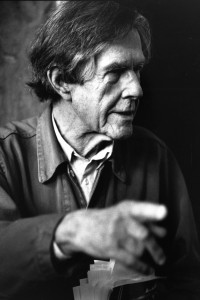Avant-Garde Music Composer John Cage Celebrated with Exhibit, App

Influential experimental music composer, writer and artist John Cage (1912-1992), famous for his avant-garde music, was affiliated with Wesleyan from the 1950s until his death in 1992. During his 37-year relationship with Wesleyan, Cage collaborated with members of the Wesleyan music faculty, composed and performed on campus, and was a fellow at the Center for Advanced Study in 1960–61 and 1969–70. Wesleyan University Press published several of his books.
To honor Cage’s time and achievements at Wesleyan, the university is celebrating the centenary of Cage by focusing on his understanding of music as a social process through a collection of events.
Wesleyan’s Special Collections and Archives is hosting an exhibition titled “John Cage Writes” Dec. 3-March 10, 2013. The exhibit, mounted in the museum cases on the first floor of Olin Library, focuses in part on the five books Cage wrote that were published by Wesleyan University Press: Empty Words, M, Silence, X, and A Year from Monday. Silence has been hailed as one of the most important works on music by a 20th century composer.
“Although he’s best-known as an avant-garde composer, John Cage also wrote pioneering books and this exhibition will spotlight his literary endeavors,” says Leith Johnson, university archivist, who is curating the exhibition with Suzy Taraba, director of Special Collections and Archives.

Cage donated the papers related to his writing to Wesleyan and the exhibition draws on these materials, the archival records of Wesleyan University Press, and other SC&A collections. Among the items included in the show are correspondence, notebooks, manuscripts, photographs, editions of Cage’s works, and examples of his influence on book artists.
There’s also an app for that.
Musician Jack Freudenheim ’79, working in conjunction with Larson Associates and the John Cage Trust, created an app that lets a user play the sounds of John Cage’s ‘prepared piano’ released in time to celebrate what would have been Cage’s 100th birthday. Learn more about the app in this past Wesleyan Connection story.
In addition, the Center for the Arts hosted three musical performances on “John Cage and Public Life” as part of its “Music & Public Life” series, a year-long campus and community-wide exploration, celebrating and studying the sounds, words, and spirit of music.

